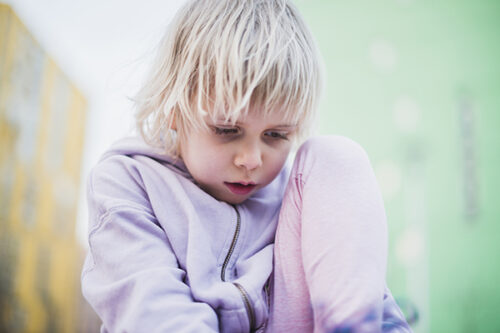Death and Loss
Helping kids process grief can feel overwhelming. Let us guide you and your child.

Death and Loss
 The experience of death and loss is one of the most profound and difficult challenges a child can face. Whether the loss involves a loved one, a pet, or even the end of an important relationship, the emotions that arise can be overwhelming and confusing. Shiva Movafaghian, an experienced psychotherapist, certified play therapist, and certified life coach, has over 15 years of experience in supporting children and families through the grief process. Her compassionate and personalized approach helps children understand and cope with their feelings of grief, providing them with a safe space to process and heal.
The experience of death and loss is one of the most profound and difficult challenges a child can face. Whether the loss involves a loved one, a pet, or even the end of an important relationship, the emotions that arise can be overwhelming and confusing. Shiva Movafaghian, an experienced psychotherapist, certified play therapist, and certified life coach, has over 15 years of experience in supporting children and families through the grief process. Her compassionate and personalized approach helps children understand and cope with their feelings of grief, providing them with a safe space to process and heal.
Grief in children often presents differently than in adults. It can manifest as sadness, anger, confusion, anxiety, or even physical symptoms like stomachaches or headaches. Some children may seem fine one moment and then become deeply upset the next, as they try to make sense of their loss. Shiva’s first priority is to create a safe and supportive environment where children feel comfortable expressing their emotions, no matter how intense or complicated. Her sessions are child-centered and focused on meeting each child where they are in their grief journey.
One of the primary techniques Shiva uses to help children cope with loss is play therapy. Play therapy allows children to express their grief through play, which can be a powerful tool for communication when words are not enough. Through activities like drawing, storytelling, and role-playing, children can process their feelings and memories in a way that feels natural and less intimidating. For instance, a child who has lost a loved one might create a story or use figurines to act out scenarios related to their grief. Shiva observes these play patterns to gain insight into the child’s emotional state and tailor her support accordingly.
Shiva also incorporates grief-focused narrative therapy, where she helps children tell the story of their loss in a structured and meaningful way. This process can involve creating memory books, writing letters to the person they lost, or sharing stories about special moments. By giving children the opportunity to remember and honor their loved one, Shiva helps them keep a sense of connection while also acknowledging the reality of their loss. These activities validate the child’s grief and allow them to process their emotions at their own pace.
Emotional regulation is another essential part of Shiva’s approach. Grief can bring up a wide range of emotions, and children may not know how to handle feelings like anger, guilt, or fear. Shiva teaches children mindfulness and grounding techniques to help them calm themselves when their emotions become overwhelming. This might include deep breathing exercises, guided imagery, or using sensory objects like stress balls to manage anxiety. These coping skills empower children to feel more in control of their emotional responses, promoting resilience during a difficult time.
 Shiva also focuses on helping children understand the concept of death in an age-appropriate way. Depending on the child’s developmental stage, she explains death and loss in a manner that is honest yet gentle. For younger children who may not fully grasp the permanence of death, Shiva uses simple language and metaphors to help them comprehend what has happened. She reassures children that it is okay to ask questions and express their confusion, creating an open dialogue where they feel heard and supported.
Shiva also focuses on helping children understand the concept of death in an age-appropriate way. Depending on the child’s developmental stage, she explains death and loss in a manner that is honest yet gentle. For younger children who may not fully grasp the permanence of death, Shiva uses simple language and metaphors to help them comprehend what has happened. She reassures children that it is okay to ask questions and express their confusion, creating an open dialogue where they feel heard and supported.
Parental involvement is a critical component of grief therapy. Shiva works closely with parents to provide guidance on how to talk to their child about death, what behaviors to expect, and how to support their child’s emotional needs. She encourages parents to model healthy grieving behaviors, such as openly expressing their own sadness while also demonstrating self-care. Shiva’s parent coaching sessions offer practical strategies for comforting a grieving child, like using consistent routines to create a sense of stability or participating in family rituals to honor the memory of the person who has passed.
In addition to working with parents, Shiva provides resources and support for families navigating the complexities of grief together. Family therapy sessions can be particularly helpful when the entire family is experiencing loss, as they provide a space for shared healing and connection. Shiva guides families in having meaningful conversations about their grief, helping them support one another and strengthen their bond during a difficult time.
For children who experience complicated grief or prolonged emotional distress, Shiva is trained to recognize when additional support is needed. She provides specialized interventions to address any unresolved grief or trauma, ensuring that the child receives comprehensive and compassionate care. Her approach is rooted in a deep understanding of neuroscience and child development, which allows her to tailor her methods to each child’s unique needs.
Shiva Movafaghian’s gentle and holistic approach to grief and loss has helped many children and families find hope and healing. By providing a safe space for expression, teaching coping strategies, and involving the whole family in the healing process, she guides children through their grief journey with empathy and understanding. Her commitment to honoring each child’s experience and fostering resilience has made a lasting impact on the lives of those she has supported through the most challenging moments of loss.
Online Courses & Tools

Solutions for Sleeping Disorders
Getting a good night’s sleep is essential for both children and parents. In this episode, we discuss common sleep disturbances in children and explore the science behind sleep disorders. […]
FREE

SOS Help for Emotions: Managing Anxiety
SOS Help for Emotions – Managing Anxiety, Anger, And Depression is a self-help book that is fun to listen to and easy to apply. […]
FREE

Children's Anxiety
Anxiety in children can be subtle yet deeply disruptive—affecting their emotional development, school performance, and relationships. This comprehensive course, […]














